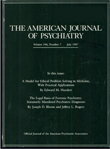Clinically defined vascular depression
Abstract
OBJECTIVE: The authors' goal was to examine the clinical presentation of a group of depressed elderly patients with clinically defined risk factors for vascular depression compared with a group of elderly depressed patients without such risk factors. METHOD: Cognitive deficits, disability, and depressive symptoms were examined in 33 consecutively recruited elderly patients defined as having vascular depression and 32 patients defined as having nonvascular depression according to their scores on the Cumulative Illness Rating Scale- Geriatrics. RESULTS: The patients with vascular depression had greater overall cognitive impairment and disability than those with nonvascular depression. Fluency and naming were more impaired in patients with vascular depression, and they had more retardation and less agitation as well as less guilt feelings and greater lack of insight. CONCLUSIONS: The symptoms of vascular depression are consistent with lesions that may damage striato-pallido-thalamo-cortical pathways and other areas. The concept of vascular depression can provide the impetus for investigations of prevention and treatment of cerebrovascular disease and for studies of the course of vascular depression and selection of antidepressants.



